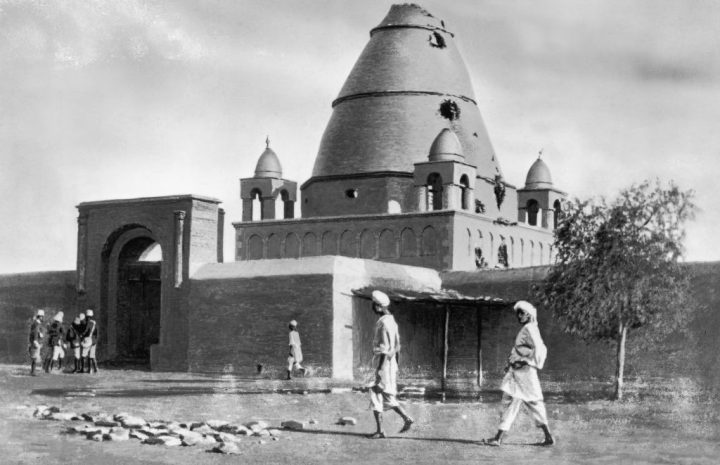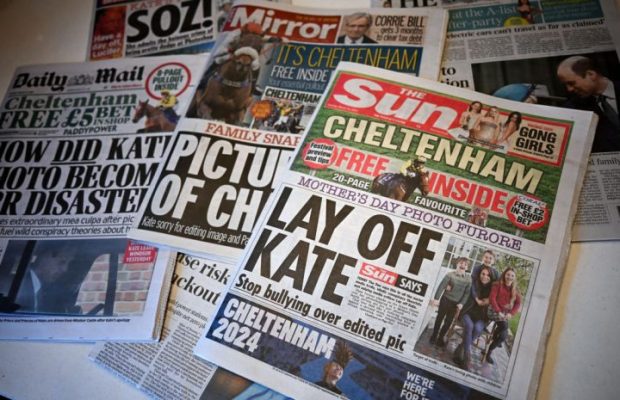A 72 hour truce between rival military factions has been brokered in Sudan’s civil war by US Secretary of State Anthony Blinken. But whether this one holds, or falls apart like the previous ones, the history of one of Africa’s largest countries is a troubled one. It is also not the first time that an emergency evacuation of British citizens has caused a British political storm.
In 1884, just as today, a British prime minister was under intense pressure to rescue British citizens from savage fighting in Sudan’s capital Khartoum. So violent was the criticism of the ‘dithering’ in Downing Street then, that it almost destroyed the career of the grand old man of Victorian politics, the great Liberal statesman William Gladstone.
Public demands for vengeance saw the great Victorian military hero, General Kitchener, sent to Sudan to exact revenge
A stern critic of imperialism at the height of the British Empire, Gladstone had resisted getting involved in the Sudan in the first place. But now that the lives of one of the great imperial heroes, General Charles ‘Chinese’ Gordon, was, along those of his companions, at stake, besieged in Khartoum by an Islamic army, Gladstone was finally forced to act by the sheer weight of public opinion.
He despatched a task force under another military hero, General Sir Garnet Wolseley, down the Nile from Egypt to save Gordon from the followers of the Mahdi, or ‘guided one’, Muhammad bin Abdullah. A charismatic self proclaimed Islamic ‘Messiah’, his forces had swept across Sudan and now had Gordon and his staff bottled up in Khartoum.
Gordon was a strange figure. An austere religious fanatic who devoted his spare time to ‘saving ‘ delinquent boys in London‘s slums, he had won his ‘Chinese Gordon’ nickname for his successful suppression of the Taiping Rebellion in China.
Sent to Sudan as governor general by Gladstone with strict instructions to restore order and then get out, Gordon had abolished the local slave trade and safely evacuated 2,000 British nationals and their dependents. He then defied his orders and stayed on in Khartoum with a small staff, refusing the Mahdi’s invitation to convert to Islam, and allowing himself to be besieged in the British legation.
Back home in Britain, the popular cry to ‘save Gordon’ was taken up by Queen Victoria herself, forcing a reluctant Gladstone to act. But he was too late. When Wolseley’s expedition reached Khartoum and relieved the siege on 28 January 1885, they found that Gordon’s garrison had been overwhelmed only two days before. The general himself had been killed and ended with his head on a spike.
Furious outrage in Britain was intense. Gladstone was blamed for Gordon’s ‘martyrdom’ and the following year his government fell. But public demands for vengeance saw another great Victorian military hero, General Sir Herbert Horatio Kitchener, sent to Sudan to exact revenge.
The Mahdi had, in the meantime, died of typhus. But Mahdist forces under his successor, Abdullahi ibn Muhammad, known as the Khalifa, still controlled the vast country and threatened Britain’s rule of Egypt.
Kitchener, like Gordon, was an eccentric with his own agenda. In September 1898, at Khartoum’s twin city, Omdurman, his Anglo-Egyptian army, equipped with artillery and machine guns, destroyed a Mahdist force twice its size, killing more than 12,000 dervish warriors for the loss of less than fifty of its own men.
Among those at the battle, taking part in a cavalry charge by the 21st Lancers, was an ambitious young Winston Churchill, half triumphant and half appalled by the slaughter. The implacable Kitchener, to Queen Victoria’s horror, had the Mahdi’s tomb blown up and his bones thrown in the Nile, though it was rumoured that he retained the skull to use as a drinking goblet or inkwell.
A year after Omdurman, in 1899, the Khalifa’s last army was defeated and he died in the battle. Both Egypt and Sudan remained under British rule as a dependency of the Empire until after the second world war. A Mahdist Islamic movement called the Ansar, based on Aba island in the Nile and led by the Mahdi’s blood descendants, continued to be a strong force in Sudanese politics.
The original Mahdi’s great-grandson, Sadiq al-Mahdi, led the civilian opposition to the military dictators who have ruled Sudan for much of modern times. He himself served as president in the 1980s. After his death in 2020 his family continued to control the Ansar movement, which, with its illustrious religious roots will still have a future in a country with such a turbulent past.
Got something to add? Join the discussion and comment below.
Get 10 issues for just $10
Subscribe to The Spectator Australia today for the next 10 magazine issues, plus full online access, for just $10.




















Comments
Don't miss out
Join the conversation with other Spectator Australia readers. Subscribe to leave a comment.
SUBSCRIBEAlready a subscriber? Log in